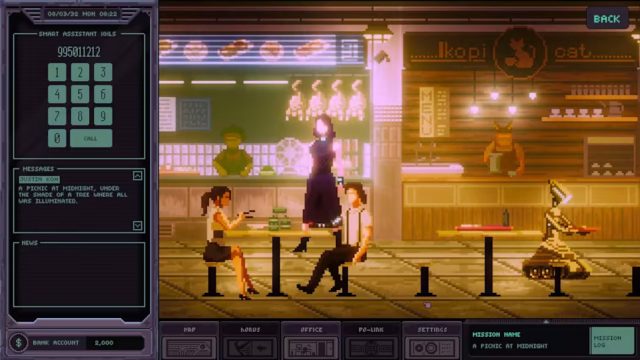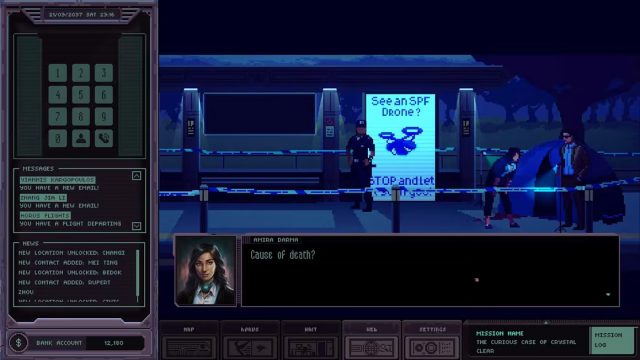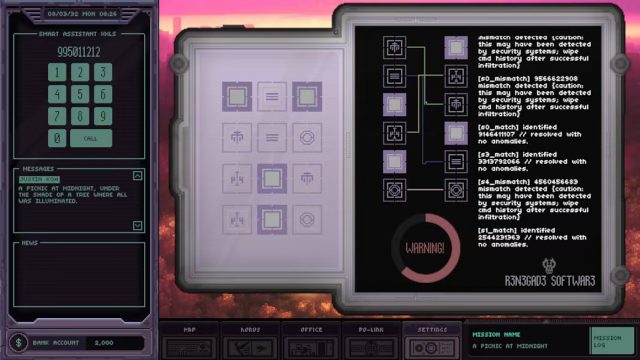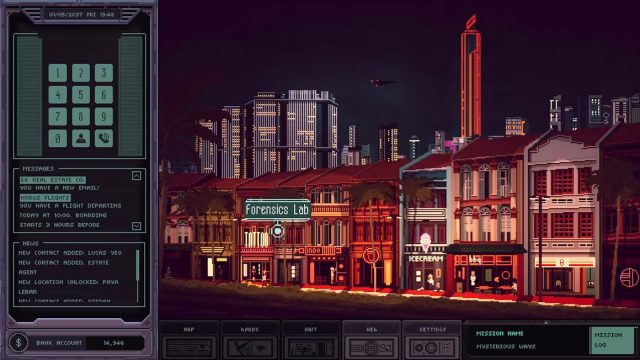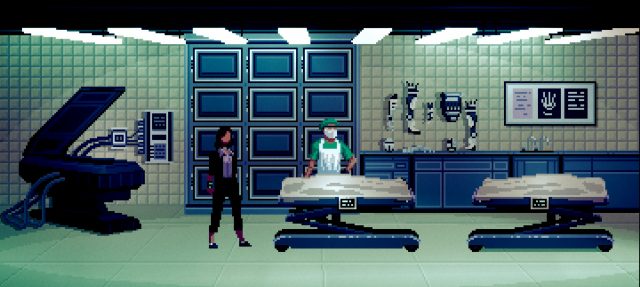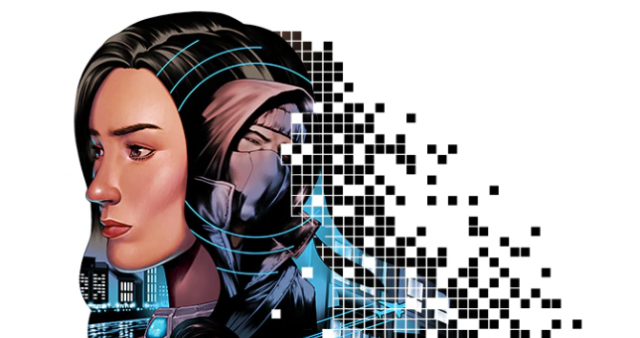Beautiful pixel art; unique gameplay mechanic that requires real-world research to solve puzzles; interesting setting; brings up social and philosophical questions that make you think; provides lots of opportunities to learn cool historical facts; pleasant but somewhat limited soundtrack
Mostly lackluster story that becomes preachy and relies on too many trite tropes and elements; bugs galore; poor sound quality and spoken lines that don't match up with written dialogue; typos, misspellings, and cringey writing; awful voice acting
Welcome to another Backlog Review, where we take a look at an older game that fans might have sitting waiting to be played or are still considering giving a purchase. This time we’re looking at Chinatown Detective Agency.
Chinatown Detective Agency (CDA) had the potential to be a really unique, interesting experience and one I had high hopes for. I knew nothing about it, had never heard of it before, but gave it a shot based on the trailer alone (which does a good job of making the game seem much more interesting and well done than it is) and the fantastic art style.
Sadly, this was one of the worst games I’ve played in a while, which does no justice to some of its genuinely great mechanics and the few things it does well. With a somewhat nonsensical story, bugs galore, and terrible sound design, CDA sabotages itself and squanders its opportunity to shine.
Moving forward, this review will be littered with spoilers, as many of my issues center around the story itself including the ending. I won’t give spoiler warnings throughout, so you’ve been warned — proceed with caution.
You play as Amira Darma, former INTERPOL officer turned PI who’s just opened her own firm, Chinatown Detective Agency, in Singapore. Set in the near future of 2037, the world is in chaos due to global economic stagnation which has brought many countries to the brink of societal collapse. Crime and corruption run rampant, even in places once vibrant and thriving, supply chains are a mess, inflation is out of control, shortages of everything from basics to luxuries abound, and many around the world lack access to clean water.
Machine learning (ML) and AI research advanced to the point where automation and robotics made human labor obsolete, with industries like fast food and customer service operating entirely on bot labor. Many people have robot assistants or AI-powered devices in their homes, drones are ubiquitous (and dangerous), and the proliferation of robots in every aspect of society has many (including Amira) questioning whether humanity has developed an over-reliance on tech.
At some point, a group of Korean and Chinese companies acquired majority ownership of public companies and took them private, including public utilities. As they continue to monopolize, the world continues its descent into destruction.
Amira finds herself quickly pulled into the darkness from the first case that comes across her desk, and at first, I was instantly absorbed into this dystopian, bleak world and the seedy underbelly of 2037 Singapore. Unfortunately, it didn’t take long for the game to dissolve into a clunky, buggy, ham-fisted mess.
CDA is a point-and-click adventure game that reminded me of Mario is Missing and Carmen Sandiego at times. The HUD consists of your phone screen on the left side of the screen (a phone which is oddly archaic by 2023 standards let alone what I’d expect a phone screen in 2037 to look like — it has distinct Metal Gear Solid Codec vibes) and the main action on the right. Beneath the screen are the map, Horus (the in-game flight booking app), and the mission log/evidence log. On the Switch, these are accessed using the left and right shoulder buttons on your Joy-Con.
Your phone is the most basic phone I’ve seen since my flip phone from 2009: it’s got a dial pad, contacts (which you gradually unlock through the course of the story), messages, and news (which alerts you to events like unlocking a new contact). Amira can’t check her email on her phone and will only receive a message alerting her when she has new emails, meaning you have to travel back to your office every time you need to check your email, which is frequently. This isn’t just inconvenient, it’s confusing: why wouldn’t a jet-setting PI not have the ability to check her email on the go in this very futuristic world?
Locations within Singapore are accessed via the map. Click on the area you want to travel to and you’ll zoom there via train. Every location you visit, including foreign countries, provide the player with a brief description of the real and imagined history of the place up to in-game present day. Time passes, with real-life seconds counting for in-game minutes, and some tasks can only be completed during certain times; missions can be failed if you miss deadlines or aren’t punctual to meetings. You have to book flights to different global locations to finish cases, and you can’t board your flight more than three hours ahead of time. Luckily, there’s a wait feature that lets you skip ahead 1-48 hours.
CDA’s strongest feature is its most unique: the necessity to do real online searches to figure out solutions to puzzles. An early example of this is during a case, when an idealistic trust fund baby tasks Amira with returning valuable stamps back to their “rightful” countries of origin (we’ll touch more on this ridiculous story later). Upon examining the stamps in the evidence log, you can see a cancelation mark with the last few letters of a city on the stamp. Amira must figure out what country the stamp came from, bonus if she can figure out which city the cancelation mark was from. Using clues from the stamp, I was able to do some Google searches to find images of the real stamp and then continued my sleuthing from there until I figured it all out.
This puzzle-solving method exposes the player to some cool and genuinely interesting historical facts, which I thought was great. But at times, the puzzles were overly convoluted and difficult and I’m not sure how I would’ve been expected to even figure out a starting point for solving them myself. Much later in the game, you gain possession of a clay tablet with a symbol-based language etched onto its surface. I’d never seen anything remotely like these symbols and had no idea what it could be, so I called up Mei Ting, Amira’s insufferably hyper and enthusiastic librarian friend who can solve any mystery imaginable and has instant access to Enigma machine simulators, telegraphs, and whatever else you could possibly need.
In this case, she was able to quickly identify the language on the tablet as ancient Sumerian. Not sure how I was supposed to know that myself, but this is one of many puzzles that just feel like an overly complicated chore by the end of the game. And with the option to have Mei Ting provide a solution to every mystery you can contact her about (for a small fee), Google searches start to lose their appeal when the answer is just a click away.
Gameplay overall is just mostly walking around, at one glacial pace, and pressing A to interact with things in your environment, but the game is riddled with bugs. Everywhere. There were moments where Amira’s sprite continued to walk forward in place even while talking to someone, or would bug out and shake if walking between two points you could interact with. Text scrolling would sometimes glitch, or characters would moonwalk into the scene facing the wrong way, even during the game’s denouemont which completely ruined what was supposed to be a dramatic entrance.
Really not sure how or why this game was released in such a shoddy state, which extends especially to its audio.
Many, many instances of spoken dialogue didn’t match up with the accompanying text. It ranged from some changed up or missing words or phrases to multiple lines that were entirely different. Some lines would mistakenly repeat or play at the wrong times. And some character audio was so low that they were basically inaudible.
Most of the voice acting was terrible, with the exception of Justin Koh, Amira’s old colleague and mentor. Antagonists were comically awful, like Laetitia, the cutthroat CEO turned friend turned employee who sounds like every stereotype of the affluent, cold, successful business woman. Mei Ting was particularly insufferable, with an over-the-top enthusiasm that sounded like the voice actress’s direction was “sound as fake and cornball as humanly possible.”
The game’s soundtrack, while pretty limited, was nice and had a dark, noir/cyberpunk-inspired sound that made for easy listening. However, background sounds were incredibly one-note and didn’t make sense in some environments. Nearly every location had the sound of honking, traffic, and general street noise in the distance, even in places where you likely wouldn’t be able to hear it, like in the bowels of an AI training chamber where Amira is trapped at one point, or dozens of stories above ground in a state-of-the-art skyscraper where the glass is likely soundproof. It just felt like lazy sound design.
This game’s story feels like an amalgamation of every “capitalism is bad, eat the rich” thread you can find on Twitter. I’ll give CDA some credit where it’s due: it does bring up some interesting questions about the consequences of continuing down the path of heavy research and investment into ML and AI for every facet of our lives and businesses. The devs seem to share my wariness about what it means for our humanity, our interpersonal relationships and ability to connect with one another, the ability of people to continue to make a living even if they aren’t in tech, with the shadow of becoming obsolete and replaced with robots looming overhead. And is it smart to create intelligent robots that could potentially become self-aware? Or are we the architects of our own destruction?
Sadly, what could be a fascinating exploration into the dangers of automation and AI just winds up becoming a slog through trite tropes and lazy characterizations. One of the main antagonists is an evil, anti-unionization rich French guy whose family has ties to Vichy France — the fascist regime that had a policy of collaboration with Nazi Germany — and is a WWII-obsessed LARPer who was once caught wearing German regalia and throwing up the Sieg Heil.
Yes, ladies and gentleman, one of the bad guys is a Nazi, a fascist, a far-right authoritarian, and a staunch capitalist. I mean, my God, are there any other terminally online tropes the writers could’ve slapped onto this painfully uncreative caricature of an antagonist?
The heroes in this world, of course, are the workers across the world engaging in a socialist uprising against The Man, coming together to push back on exploitative labor practices and, as one socialist in the game put it, “throw rocks at billionaires.” If you look closely in one of the locations, you can even see “eat the rich” graffitied onto a wall, while “the state has failed” is tagged on the inside of the train doors as you travel from location to location.
The player eventually needs to decide which of their first three clients they want to work for full-time, which will decide the course of the rest your playthrough. The only story that was anywhere near interesting was the “Singaporean government is poisoning everyone but the rich with toxins in the water and someone was killed to cover it up” storyline. Otherwise, I had to choose between a shady chainsmoker who works for some underground group that I lost interest in pretty fast, or the heir to a fortune of a fake religion who thinks private art collecting and stamp collecting is bad. His thing seemed to be, “My family profited from selling lies of salvation to people, so to write their wrongs I’m going to donate my father’s art and stamp collection back to their countries of origin, where they belong.” The stamp thing baffled me; stamps are supposed to leave their place of origin, they exist to ship things away. They don’t belong anywhere but on an envelope or a box. So I’m not sure how this guy thinks he’s making a difference by donating stamps to museums other than satisfying something in his conscience, which doesn’t make for an interesting plot line.
Amira, our fearless protagonist, is one of the worst PIs I’ve ever seen in media. She’s sloppy, reckless, and unbearably and constantly quippy. She makes rookie mistakes I don’t understand from a seasoned, former INTERPOL member and fails to see painfully obvious, predictable outcomes that I saw coming a mile away despite doing investigative work for a living. She’s estranged from her father and her mother left them during her childhood, so she creates a new family — yes, family — with her colleagues.
In my playthrough, these colleagues included Laetitia, a CEO she met months before and who she knows barely anything about, who was once accused of murder and who Amira despised for quite a while; Mei Ting, a librarian who she only contacts when she needs help and who she also met mere months prior; and Justin, her old colleague, mentor, and friend of her father who is the only person who I could see her calling family.
Some of the only solid writing in the game are the numerous emails you have to pore through. Many of them felt authentic, especially less formal emails between coworkers or more formal emails between professionals. Amira even receives a spam email at one point for male… performance meds, which looked and read exactly like such trashy spam emails. (Though it didn’t escape my notice that the subject line, which the spammer forgot to fix before sending, read, “[Bullshit incel promo copy here: Frank],” because the writers needed to get in as many Twitter buzzwords as they possibly could.)
The only thing worse than this game’s writing is its grammar. The text is littered with typos and misspellings that are distracting and should’ve been caught during the editing process, but given the other problems with this game I somehow doubt there was an editing process.
I played CDA so you didn’t have to. Well, actually, I played CDA because I thought it would be great but it turned out to be one of the most disappointing things I’ve ever played. I have no interest in booting up a second and third playthrough to trudge through the mire of the other storylines and don’t recommend you trudge through even one of them. Play something else.




 ShareThis
ShareThis